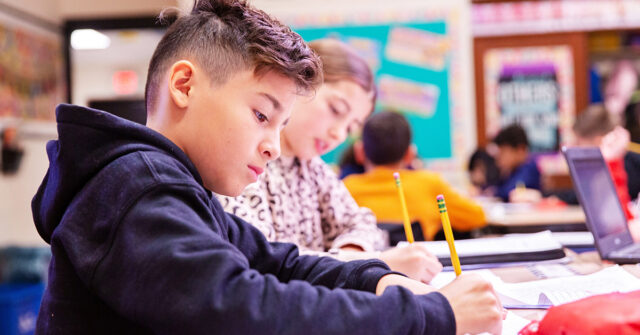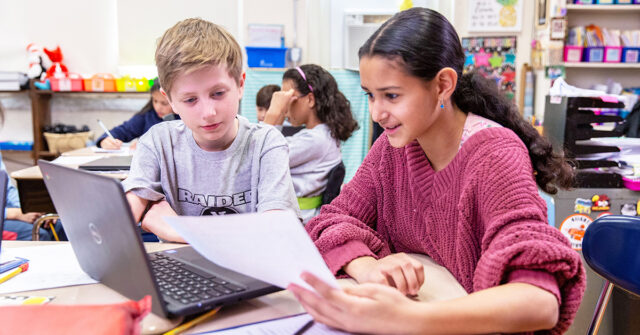
What stories make you who you are? Who are you as a reader and writer?
What stories make you who you are? Who are you as a reader and writer?
Today on the podcast we are chatting with Stephanie Affinito about her new book Leading Literate Lives: Habits and Mindsets for Reimagining Classroom Practice. Stephanie outlines a framework for reading and writing that asks educators to feed their own literate lives, and then take that energy into the classroom with suggested practices and strategies.
We began our conversation by talking about the concept of a literate life, and how it inspired this book…
Below is a transcript of this episode.
Stephanie: Well, I've always been a voracious reader and writer for as long as I can remember. I've always had a book in my hand or wished I had a book in my hand. I've been a note taker and a journaler ever since I was a little kid, and books were my friends and childhood. They became my therapists in my teenage years and young adult years. And now, they're some of my best parenting tools, but given life and the realities of it, I didn't always have the time that I wanted to dedicate to my own reading and writing. But when I did, I felt better. It was my form of self care. So some people cook, I read books. Some people have a creative hobby, I prefer to tinker in a notebook. And I noticed personally when I had a really strong, rich literate life filled with reading and writing, I acted differently.
I felt differently. I thought differently. I just felt restored. And you know that saying that you can't pour from an empty cup? Reading and writing is what fills my cup. And it doesn't stop with my personal life. It impacted my life as an educator too, because if you can't pour from an empty cup, then you can't really teach reading and writing without being a joyful reader and writer yourself. And so when my literate life was on fire at home, I brought that fire to my work. And it just reminded me of what was really important in this work that we do. And that's literally changing students' lives through literacy. And of course, the skills and standards are important, but so is our work with reading and writing identities. And tending to them can make such a difference for our own lives and for our students, and that really was the inspiration for this book. To invite teachers to cultivate their own literate lives, to experience those personal benefits so that they could bring them to their students.
Steph: And one of the main ideas that I hear in your answer to that first question is the idea of reflection and how important it is to fostering a love of reading and writing. So what does reflection look like in this kind of scenario and how does it play into this larger framework that you lay out in the book?
Stephanie: For me, reflection is the act of looking inward and really thinking about ourselves and our practices. And so often, reflection and education seems to revolve around the instructional cycle. We take a lesson or a unit of study and we ask ourselves, "What went well? What did we learn from what didn't go well? And what goals might we set?" And while that's an incredibly important aspect of reflection for our work, it can be hard to reflect on what's right in front of our eyes, but beyond our own perceptions and perspectives. So sure, I can decide what went well and what didn't go well, but what would that look like from the lens of a learner in my room? What would my learners say about the classroom, my practices, the feelings that they get when they're in the classroom and why do I even make those particular decisions in the first place?
And there's research to show that our teaching philosophies influence our actions in the classroom, but our learning histories also influence our actions. And they might not always be as conscious or as clear, but they're there. So if we think about what independent reading might look like in our classroom, does it have to be quiet? Or are students allowed to have a little hum or a buzz? Do students have to sit at their seats? Do you allow them to roam the room? Can they read freely, or are there certain habits and routines that you require around that reading? While some of those things that we do in the classroom might be in response to our standards or the mandates and the initiatives in our school, they may actually be there because of our own past experiences as a learner and what we bring into the classroom.
And part of that is also how we live our own literate lives today and how that can seep in there too. So I really believe that we need to reflect on our own histories as a learner and how and why our classrooms really operate the way that they do. And I give a few concrete invitations for how to do that work in the book, but really any kind of reflection about that is a start. That can help us think about our own habits, our own communities our, our own hearts in our literate lives and how they might actually influence the same structures in our classrooms and what students take away from that.
Steph: Yeah. And I hear you talking about this connection between reflecting on our own lives and then applying that to the classroom. And it speaks to something that I just love about this book, which is how it's organized. So each chapter, you talk about a different aspect of building illiterate life that really could be applicable to anyone. So if you're listening to this and you're not a teacher educator, you just love reading and writing, you should still read this book.
Stephanie: Yes, I agree.
Steph: Right. Yeah. But then you kind of intersperse in each chapter with these real concrete strategies for bringing those ideas into the classroom. And some of them are just so creative and they really remind me a lot of some of the things that you wrote about in your previous book, Literacy Coaching. And so I'm curious why you felt it was so important to have both these perspectives? The kind of everyday concept mixed with the very planned out concrete classroom strategy.
Stephanie: Well, I really wrote this book first and foremost for teachers as a way to reclaim or recreate or reconnect with their own literate lives first. Just as humans, not as teachers, but as readers and writers, like I found such a benefit in my own life. I wanted them to feel like this book was a smorgasbord of invitations. That they could indulge and pleasurable reading and writing for fun, which is something they might not allow themselves to do given our busy schedules as educators. But I also wanted to invite them to really reflect on how that newfound love and time for their own literate life could influence their classrooms for the better too. As I mentioned, when we feel fueled up and filled up by reading and writing, we often can't help but share that excitement when others. When we read a new great title, we often have to call a friend and recommend that they read it.
Or if we are writing something ourselves, we can kind of identify as fellow readers and writers with our students, which brings a different level of connection with them. So for almost every invitation in the book, I offer teachers to build their own literate lives. I do provide a concrete example of how that could bring that same literate fire to their own classrooms. Not only does it help teachers re-imagine their classroom practices, but it gives them even more reason why this work in their own life is so important. And I feel like that's a needed permission slip that teachers need to indulge in their own reading and writing. And that was really important for me to convey in the book.
Steph: I am curious about the role that literacy plays in our current moment, which could mean a million things. We have ever shifting politics, we have conversations about race in our history as a country. We have an ongoing pandemic, which I think requires really strong literacy skills to decipher information about changing CDC guidelines and vaccines and new regulations. And so can you just talk a little bit about why this literacy work is so important right now?
Stephanie: Absolutely. And I think right now, we need a robust literate life more than ever. So personally speaking, just thinking about the recent events of the world, books really have changed the way I think about the world and how it works for all of us that are in it. As a child, I grew up in an area where most everybody around me looked like me and no one questioned my place in the world. I had books at my disposal and media at my disposal that had characters that all looked like me and convinced me that if I set my mind to something, I could accomplish whatever goals I wanted and I had enough resources around me to breach those goals. So I really did have a pretty limited view of the world early on. I just had my one single perspective to draw on.
And for me, the single most important factor and broadening my understandings and really thinking about how does the world work, is through reading books, and especially children's literature. So books, they've invited me to experience new perspectives. Perspectives of race, gender, sexual orientation, age, socioeconomic status, religion, disability, all the perspectives that I could never ever experience and truly understand myself.
But by living those experiences through the pages of the book, you can't help but broaden your understanding of the human experience and how the world works. And I started to question the world and the fairness of the world for everyone, how it works and what my place actually was in it. And I don't think I would have done that as readily without having those books to really make me think. So without a rich literate life and without really carefully tending to the books that you're purposely reading and learning from, I wouldn't have even begun to understand the work that still has to be done.
So I really believe that books and those amazing brave authors who are writing and sharing their stories are giving us entry points to this really important understanding of world and how it's changing and what that means for all of us, including the work that a lot of us have to do to make it a more just place. I think books are a start. They're not the end, but they are a really important entry point for all of us, I think.
Steph: And so for our very last question, how do you hope to see this book used in the world?
Stephanie: I love this question. I hope that educators everywhere will see this book as a reminder that their own literate lives matter. That they deserve time and they deserve attention and they deserve a space to really grow their reading and writing lives in ways that matter to each individual person so that we can all feel restored and nourished and fill our cups as educators and particularly, literacy educators. And in the book, I offer 54 different ways for teachers to do just that. And if we duplicate each of those, what we do for reading, we do for writing and what we do for writing, we also do for reading, the book offers over 100 different concrete, practical, easy ways to really give yourself the time to indulge your own reading and writing. Because I really think that when we feel nourished, when that cup is full, then we're in a better place to serve students.
We're in a better place to create those joyful, meaningful, literate communities that matter so much in our classroom. And so I really hope that this book helps teachers feel like I've given them permission to find or make the time that they wished they had to read and write without feeling guilty, without feeling like they're being selfish by taking time out for themselves. And reminding them that that work holds significant importance for how their students might think about reading and writing as well. Ultimately, I truly believe that a life well read is a life well lived. And so I hope this book really gives us a chance to come together as readers and writers, so we can feel the power of leading a literate life and then hopefully, sharing those same gifts with all of our students.
 Stephanie Affinito is an educator in the Department of Literacy Teaching and Learning at the University at Albany in New York. She has a deep love of literacy coaching and supporting teachers’ learning through technology. Stephanie creates spaces for authentic teacher learning that build expertise, spark professional curiosity and foster intentional reflection to re-imagine teaching and learning for students. She is the author of Literacy Coaching: Teaching and Learning with Digital Tools and Technology and Leading Literate Lives: Habits and Mindsets for Reimagining Classroom Practice. She presents regularly at state and national conferences on literacy coaching, teacher collaboration, and supporting teachers’ reading, writing, and learning through innovative technology.
Stephanie Affinito is an educator in the Department of Literacy Teaching and Learning at the University at Albany in New York. She has a deep love of literacy coaching and supporting teachers’ learning through technology. Stephanie creates spaces for authentic teacher learning that build expertise, spark professional curiosity and foster intentional reflection to re-imagine teaching and learning for students. She is the author of Literacy Coaching: Teaching and Learning with Digital Tools and Technology and Leading Literate Lives: Habits and Mindsets for Reimagining Classroom Practice. She presents regularly at state and national conferences on literacy coaching, teacher collaboration, and supporting teachers’ reading, writing, and learning through innovative technology.
You can connect with her online at stephanieaffinito.com and on Twitter at @AffinitoLit


